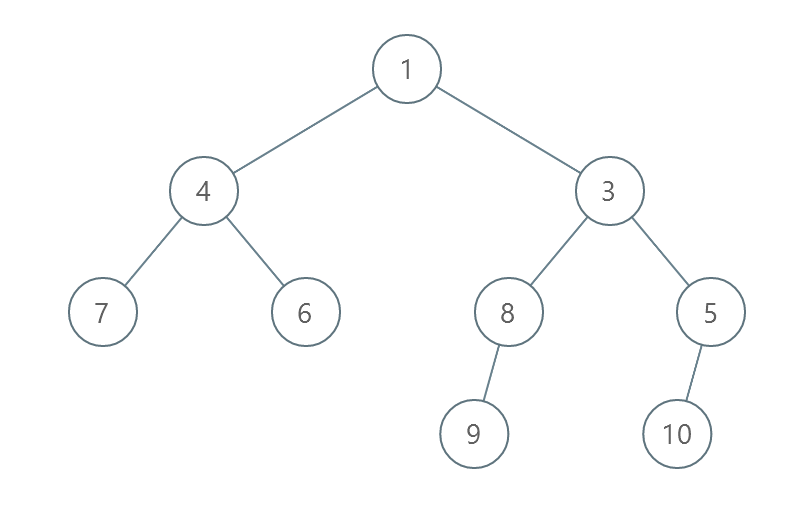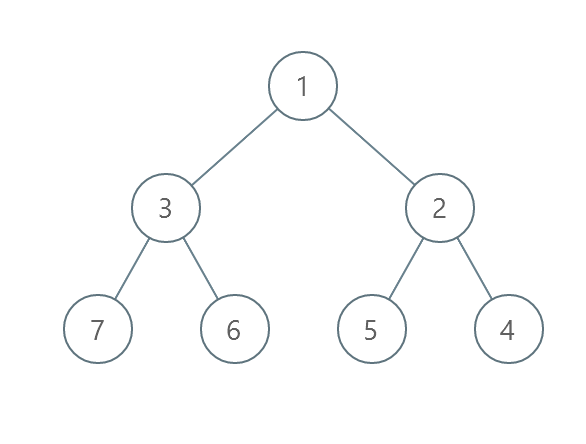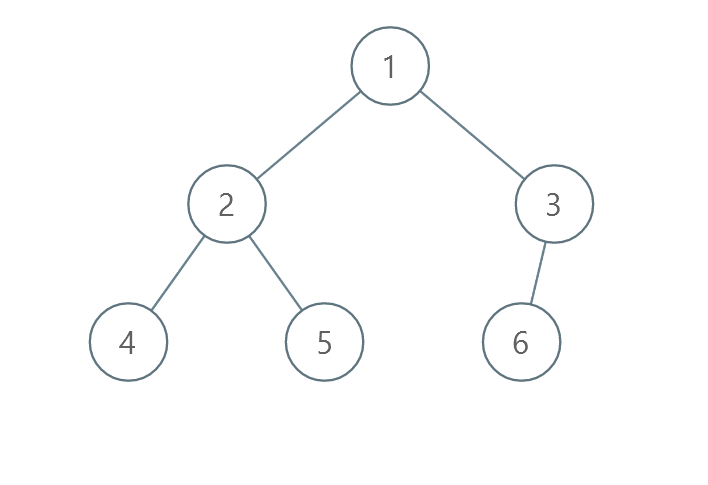Problem
You are given the root of a binary tree with unique values.
In one operation, you can choose any two nodes at the same level and swap their values.
Return **the minimum number of operations needed to make the values at each level sorted in a *strictly increasing order***.
The level of a node is the number of edges along the path between it and the root node.
Example 1:

Input: root = [1,4,3,7,6,8,5,null,null,null,null,9,null,10]
Output: 3
Explanation:
- Swap 4 and 3. The 2nd level becomes [3,4].
- Swap 7 and 5. The 3rd level becomes [5,6,8,7].
- Swap 8 and 7. The 3rd level becomes [5,6,7,8].
We used 3 operations so return 3.
It can be proven that 3 is the minimum number of operations needed.
Example 2:

Input: root = [1,3,2,7,6,5,4]
Output: 3
Explanation:
- Swap 3 and 2. The 2nd level becomes [2,3].
- Swap 7 and 4. The 3rd level becomes [4,6,5,7].
- Swap 6 and 5. The 3rd level becomes [4,5,6,7].
We used 3 operations so return 3.
It can be proven that 3 is the minimum number of operations needed.
Example 3:

Input: root = [1,2,3,4,5,6]
Output: 0
Explanation: Each level is already sorted in increasing order so return 0.
Constraints:
The number of nodes in the tree is in the range
[1, 105].1 <= Node.val <= 105All the values of the tree are unique.
Solution (Java)
/**
* Definition for a binary tree node.
* public class TreeNode {
* int val;
* TreeNode left;
* TreeNode right;
* TreeNode() {}
* TreeNode(int val) { this.val = val; }
* TreeNode(int val, TreeNode left, TreeNode right) {
* this.val = val;
* this.left = left;
* this.right = right;
* }
* }
*/
class Solution {
public int minimumOperations(TreeNode root) {
Queue<TreeNode> nm=new LinkedList<>();
nm.offer(root);
int s=0;
while(!nm.isEmpty())
{
int m=0,l=nm.size();
List<Integer> kk=new ArrayList<>();
for(int i=0;i<l;i++)
{
if(nm.peek().left!=null)
{
nm.add(nm.peek().left);
}
if(nm.peek().right!=null)
{
nm.add(nm.peek().right);
}
int f=nm.poll().val;
kk.add(f);
}
s+=task(kk);
}
return s;
}
public int task(List<Integer> nm)
{
Map<Integer,Integer> kk=new HashMap<>();
for(int i=0;i<nm.size();i++)
{
kk.put(nm.get(i),i);
}
Collections.sort(nm);
boolean k[]=new boolean[nm.size()];
int s=0;
for(int i=0;i<nm.size();i++)
{
if(k[i] || kk.get(nm.get(i))==i)
{
continue;
}
int j=i,m=0;
while(!k[j])
{
k[j]=true;
j=kk.get(nm.get(j));
m++;
}
if(m>0)
{
s+=m-1;
}
}
return s;
}
}
Explain:
nope.
Complexity:
- Time complexity : O(n).
- Space complexity : O(n).